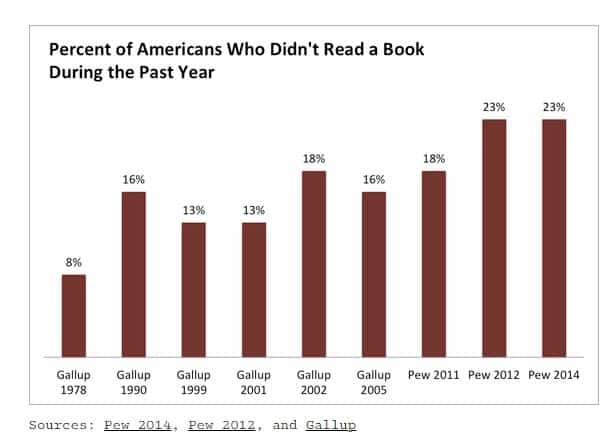What more appropriate way to open an article about books than with a Mark Twain quote: “Rumors of my demise have been greatly exaggerated.” The same could be said to apply to the general “common knowledge” that books are dying. While there are certain areas where books are in decline depending on what numbers you’re looking at, this can actually confuse the overall picture.
While things are certainly changing when it comes to books, readers, and how readers get their books and consume them, in the big pictures there’s a lot of evidence that not only are books not dead, but the number of readers might actually be back on the upswing, providing a picture of how books are becoming more, not less, necessary in the age of screens and how many demographics are already adjusting to that.
The question of whether or not books are dying isn’t as simple as a mere sound byte, not matter what some sources would want you to believe. Let’s dive into this question deeply and really get to the bottom of it!

So What Are The Stats on Reading?
Well let’s take a look at some very telling stats on reading from recent years:
- 2020 recorded the highest recorded book sales of all time according to NPD Book Scan
- 2020 recorded the highest total of physical books and digital ebooks ever recorded
- Ebook sales actually declined noticeably from 2016-2019 before 2020 brought an upsurge in ebook sales
- Despite predictions of ebooks destroying print books, they rarely account for even 25% of total book sales, meaning physical books outsell ebooks 3 to 1 (source)
These stats would indicate that not only are books not dying, but they seem to be enjoying a massive upsurge in popularity despite already being a widely popular hobby/industry. These are even unit numbers versus percentages. Percentages can be easier to manipulate, especially if an odd year comes after a long downward or upward trend, but the sheer unit numbers reported seem to indicate that there is no danger of book sales going down any time soon.
Considering the number of books the average American reads is down slightly over the past two decades (15 to 13 or 18 to 13 depending on what numbers you use), that means there must be many new readers, or lightly casual readers picking up the reading habit more seriously, to make it all work.
Well an in-depth survey by the Pew Research Center from 2016 showed that there was very little overall decline in reading, just a shift in how it was done. This showed that based on what was happening from 2011 to 2016, during that 5 year span:
- Adults who said they had read a book in the past 12 months did indeed fall 6% from 2011 to 2016…but that still left 73% as having read a book in the past year
- Adults who read a print book in the past 12 months fell from 71% to 65%
- Adults who read an e-book grew from 17% to 28%
- Adults who listened to an audio book grew from 11% to 14%
That same article notes that this means the number of people who read at least one book a year was basically unchanged (within the statistical error range) from 2012 to 2016.
And the numbers further up show that MORE books, not less, were sold from 2016 until 2020. While the pandemic no doubt had some positive effect in the number of books bought, when both percentage and total units are trending upwards, and well over 70%, it’s hard to find anything that 70% of all Americans do or agree on.
So to have that many readers makes it hard to believe that books are dying when reading books is such a widely shared practice.

The truth is that when the statistics all come into focus, we are a nation full of readers. Whether via hardcover, paperback, audio book, or ebook, the habit of picking up a good book to read, or listen to, is one that isn’t going away any time soon.
So Why Do People Think Books Are Dying If They’re Not?
There seem to be 2 main causes to this narrative that frequently pop up.
- The array of stories of bookstores going out of business
- Older generations complaining about lazy younger generations attached to their screens
The trouble is that these reasons aren’t sound when looking at the data. Tackling point one: yes, major book retailers are gone. Say good-bye to the days of Walden Books, B. Dalton’s, and Borders Books as Barnes and Nobles stands nervously as the last man standing.
But that’s true of ALL big box retailers with the rise of Amazon and E-commerce. Radio Shack is gone, but no one thinks the technology sector is dying. Sears and JC Penney are gone, but Wal-Mart and Target aren’t going anywhere. Many chain gyms are going bust, but gyms aren’t going away (just ask Alex Hormozi).
The retail apocalypse is very real, but here’s the counterpoint: independent bookstores are thriving! Their wages are up, their sales are up, and more are opening and thriving than ever before.
If books were truly dying, no used book stores or indie bookstores would be able to thrive and yet they are bucking the trend of big box stores and are doing just fine, if not outright thriving in many cases.
Ah, the second point. Well setting aside the fact that every single generation has called younger ones losers and whiners for around 2,500 years now and yet somehow civilization has continued to advance.
Then there are the direct stats that a great article by The Columbus Dispatch points out in a 2021 article which are:
- The main decline in number of books read comes from those who read more than 10+ per year commonly reading half or three-quarters as much, but still reading
- The main demographic reading less than ever before is older adults
- The main demographic of increasing readers is young adults
- Young people read more than older people
That kind of goes against the narrative of Millennials or Gen Y or Gen Z or whoever we’re on actually causing the death of reading. There’s no statistical evidence that this is the case.
Reading is alive and well, and if the old cassette audiobooks count as books…why wouldn’t ebooks or audiobooks?
A LitHub report further confirms the youth reading movement as their numbers show that the largest growth in book sales was in young adult fiction. Adult fiction came in second, then juvenile fiction was third. These were 2021 numbers which showed a massive jump in total sales.
In addition, there are articles like this one from the Gallup that show Americans are reading fewer books on average than back in 1990 and 1999 and that might be true, but in a larger context, reading peaked from 1990 to 1999 before declining again, making the already short decline seem much larger than it otherwise might.
Most of this decline comes from people who used to read 12+ books a year moving down to 8 per year. In other words, the heavy readers who still read plenty, but don’t read to the same level, depth, and extent which they used to.
But Isn’t Reading Down Since the 1980s?
Yes and no. Don’t worry, I’ll clarify what exactly that means and how the numbers play out. Because The Atlantic did an in-depth study on this topic, and even then the article calls this “Decline of reading” trend as likely over. So these numbers show a decline and prove books are dying, right?

So what do these numbers reveal to us?
The first is that people watching TV and cable had as much or a bigger impact on free reading than internet and screens did. The drop in the 1980s was 5-8% while the drop from 2010 on is 5%. So it’s the same or less, though you could argue having both compounded the effect of causing less people to read.
Well the percentages make a compelling case, there’s also something else to consider: population growth.
Assuming those charts are completely accurate, 92% of people did pleasure reading in 1978. Among 222.6 million people that meant there were just under 205 million people who read at least one book for pleasure a year in 1978.
In 2021 “only” 77% of Americans read at least one book for pleasure reading. That means there were 255.6 million readers, or over 50 million more readers than 45 years ago.
Which makes it hard to make the case that books are dying because while the percentages do show a downtrend, there’s still so many more readers, period.
That question could also be slanting results as three cultural phenomenon that exist heavily now that were much less common back then:
- Tiger parenting forcing mass reading (but no pleasure reading)
- Hustle culture (because reading for self-improvement is still reading even if it’s not pleasure reading)
- Explosion of private schools limiting available books
While these might have a nominal effect on the numbers, a few percentage points definitely changes the perspective results these polls seem to show.
How We Read Books Is Changing
There are plenty of readers – hundreds of millions, in fact, and as long as there’s a demand for it, books aren’t going anywhere. While the days of multiple big box book stores are almost certainly gone forever, that doesn’t mean books or book stores are going anywhere.
There are millions of readers who love their books and while how we read and buy books is changing, the fact that even conventional publishers both published and sold a record number of books in 2020 and 2021 shows just how overblown the “reading is dead” argument is, which I’ll point out, was alive and well in 1990 despite the fact the charts show the average books read per person per year went UP in that decade.
In addition to all this, the past decade plus has taught us a few things:
- While audiobooks and ebooks are great, they won’t come close to overthrowing in-print books
- The use of reading to disconnect from screens has been a boon for book sales
- Book buyers buy online over going to a big box book store
- Book buyers love going to and supporting small local independent book stores
The fact that there seems to be an uptick in younger readers also is a good thing for the “books are good” crowd, and further makes the fact that indie bookstores are thriving not only make more sense but makes it more likely to be a long-term trend.
Conclusion: Books Aren’t Dying, But How We Read Is Evolving
When the book industry is printing and selling a record number of books it’s hard to convincingly argue that reading is on the way out and books are dying. There are millions of more readers, indie book stores are doing great, and there are more ways to read or listen to books than ever. While there are major changes in the publishing and book retail areas, no avid reader should worry about books being on their way out.
The data clearly shows that’s just not going to happen. Books are NOT dying, and the data clearly supports that point of view.
Other Book Articles You May Enjoy
